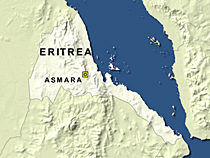2007年VOA标准英语-Eritrea Bans Female Genital Mutilation(在线收听)
Nairobi
05 April 2007
The Eritrean government has banned the practice of female genital mutilation. Cathy Majtenyi reports for VOA from Nairobi.
 |
It mandates jail terms or fines for those who not only perform female genital mutilation, but even those who provide tools for the procedure, ask for it to be done, or fail to report cases to the authorities.
Minister of Information Ali Abdu Ahmed explains to VOA why the ban was ordered.
"It is a very backward practice, which is supported neither in the Koran or in the Bible," he said. "We see it as a torture."
The government, in conjunction with the National Union of Eritrean Women, is also conducting a nationwide campaign to educate people about the negative effects of female genital mutilation.
The head of international relations at the National Union of Eritrean Women, Belainesh Seyoum, tells VOA her organization has been working with rural communities for years to educate them about the hazards of the procedure and the human rights issues involved.
Seyoum says her group will continue encouraging changes in attitude and behavior as a way to end the procedure.
"We will continue, because, you know, some people might say, 'do it hidden.' 'You cannot search houses.' We will conduct an intensive campaign on that," she said.
Female genital mutilation, which is common in parts of Africa and the Middle East, is traditionally viewed in these cultures as a rite of passage into adulthood, where a girl becomes a woman and is ready to marry and become a mother.
The procedure involves a partial or total removal of the external female genitalia or other injury to the female genital organs.
Proponents argue that the procedure discourages promiscuity and prepares girls for womanhood.
Information Minister Ali says he is confident the practice will soon be fully eradicated in his country.
"This is something that has come out through evolution and it will disappear and fade out through evolution," he said.
"This is something which was seen by so many parts of the society as tradition of the culture. To some extent, people were thinking it was religious obligation," he continued.
The World Health Organization lists many health hazards associated with female genital mutilation, including severe pain, shock, hemorrhage, urine retention, and ulceration of the genital region that could lead to hemorrhaging and infection, sometimes causing death.
Psychologically, the World Health Organization says, women may also suffer feelings of incompleteness, anxiety, and depression.